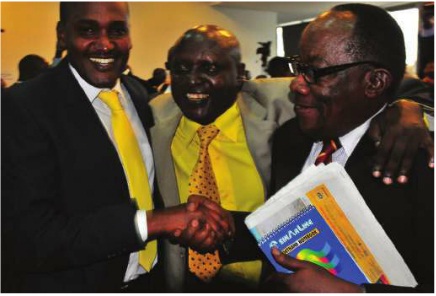At some point, Kiryowa Kiwanuka, a Museveni lawyer, rattled Twinobusingye even more with a question. “I have a concern that this matrix is a document that they have made or picked from someone,” Kiwanuka Kiryowa, one of Museveni’s lawyers told court, “we do not know what its primary data is.”
When Twinobusingye fumbled, Justice Katureebe pinned him further. “You must have taken this from somewhere,” Katureebe said. “It was given to us my lord,” Twinobusingye responded.
“Surely Mr. Twinobusingye,” Katureebe said, “when you give us something like this, you now expect us to go and plough into that sea of documents? Bring us what you are relying on.” “My lords,” Twinobusingye said, “they are making more photocopies.” But the other justices did not have Katureebe’s patience. One of them barked: “If you are not ready with that line of argument, you can go to another one”. “This is surprising to me Mr. Twinobusingye,” Katureebe said, “surely by the time you came up with this matrix, you were working with primary documents.”
“I can explain,” Twinobusingye muttered, “we got these documents yesterday, then they had to be analysed and we had to make photocopies, none the less, we shall supply them.” “Where did you get that information?” another judge shot back. Soon Twinobusingye was asking for an adjournment and Katureebe obliged him.

Karugire smiles, finally
Didas Nkurunziza, a distinguished lawyer on Museveni’s team who has been part of all the three presidential elections, kept behind as his colleagues stormed out for lunch. He was perusing a pile of documents with his glasses stooping dangerously on his sharp-pointed nose and an irritated scowl written on his chubby face. “Look at this,” he said as soon as I approached and he held a tally sheet that Mbabazi’s team had tabled, “what kind of evidence is this?”
You see, he said, in 2001, we had a major problem; the petitioner said that our client had said that he had HIV/Aids. We could not deny it. So, we said okay he said it but is it wrong? The burden of proof shifted onto the petitioner to show that it was wrong. The petitioner didn’t.
In 2006, he added, the envelopes of cash was one of the issues. The petitioner said it was bribery and it was a serious issue. That is why later presidential donations were catered for in the law.
“But in this one, there is no serious issue, there is no evidence,” he said as he slapped the sheaf of papers. No evidence was to become a refrain of the Museveni against the petitioners. During his submission, the young and voluble Ellison Karuhanga who was representing the EC rolled it off his tongue with a flourish.
“So my lords,” he said as the EC’s team was submitting earlier on during the hearing, “you have a petition which is totally and absolutely limited in scope, in extent, in substance. It is the sort of petition, my lords, that courts are pleased to dismiss.”
When court reconvened, Twinobusingye, started spewing names of polling stations, percentages of voters, and other numbers which he alleged were evidence of malpractice. But whenever they were queried, he became dumb. “Sorry my lords,” he mumbled and attempted to move on. Only to land in another jab from the Museveni team. When he attempted to close, Kiryowa again shot up.
He wanted court to compel Twinobusingye to show documents supporting his allegations. “This is a very serious allegation my lord,” Kiryowa said, “for the counsel to just stand up and say we are done with that, we can go on is not correct.”
“My understanding is that he has put that matrix aside,” the Chief Justice intervened, “we are not looking at it anymore.”
Kiryowa was not done
“My lord the figures on the second matrices are forgeries,” Kiryowa insisted, “Let him show at least one example. It is forgery, it is wrong.”
During the break, th eAttorney General, Fred Ruhindi was more brutal. “This petition deserves to be put in the museum,” Ruhindi was overheard telling the EC chairman Badru Kiggundu. “So, all along they had nothing on you?” Ahmed Kashillingi another lawyer asked as he shook Kiggundu’s hand. “Nothing at all,” Kiggundu responded as they hugged. Even Edwin Karugire, the president’s son-in-law, who had been stone-faced throughout the proceedings, allowed a smile to escape from his lips. He even hi fived and fist-popped with colleagues.
Twinobusingye had stared on blankly, knowing something brutal was happening to his case, but appearing unable to save it. Days after that scene, questions are still being asked. Why couldn’t Twinobusingye provide the primary data? Why couldn’t he show fraud in just one polling station out of 28,000?
There are many explanations being proffered to explain the Twinobusingye meltdown. However, the one we can print for now is that he was stymied by the statistics. The other is that the Mbabazi team made a fatal error in decided their strategy.
 The Independent Uganda: You get the Truth we Pay the Price
The Independent Uganda: You get the Truth we Pay the Price




One comment
Pingback: Mbabazi’s evidence on Museveni election – Twinobusingye Severino Advocates